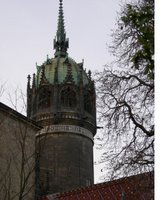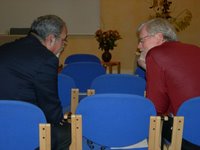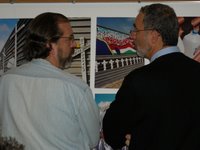Hard Conversations
 WITTENBERG -- Yesterday we focused on the separation wall in Palestine.
WITTENBERG -- Yesterday we focused on the separation wall in Palestine. "How do we express ourselves as Christians with regard to the wall in Palestine?" asked the Rev. Said Ailabouni, director, Europe and Middle East Program, Evangelical Lutheran Church in America (ELCA) Global Mission.
Ailabouni emphasized that Jesus calls Christians to follow his example by breaking down barriers that divide people. "We insist that God calls us to be peacemakers. We are committed to peace, not walls," he said in his reflection on Ephesians 2:13-22.
Seven Palestinian Christians examined the wall's impact from various angles -- economic, societal, urban planning, political. They described in detail how the wall is cutting off Palestinians from access to water, farmland, trade, health care and education. "This wall puts us in a big prison," said Victor Batarseh, mayor of Bethlehem.
The Palestinians cried out for justice, asking that the international community uphold United Nations resolutions and International Court of Justice rulings against the wall.
 Dr. Bernard Sabella, a Roman Catholic and a member of the Palestinian Legislative Council, said that the wall has been presented as a way to stop suicide bombings and reduce Israeli incursions into Palestinian territory. He said, "You cannot banish Palestinians within their own land in the name of security." Sabella argued that the wall is not only for security purposes. "If so, the wall would not go through [a Palestinian's] front yard," cutting off Palestinians from their olive trees and other means of livelihood.
Dr. Bernard Sabella, a Roman Catholic and a member of the Palestinian Legislative Council, said that the wall has been presented as a way to stop suicide bombings and reduce Israeli incursions into Palestinian territory. He said, "You cannot banish Palestinians within their own land in the name of security." Sabella argued that the wall is not only for security purposes. "If so, the wall would not go through [a Palestinian's] front yard," cutting off Palestinians from their olive trees and other means of livelihood.Katharina Wegner, a German participant, challenged Sabella's statements about security. "If we take the wall away, the [security] problems will not be gone," she said.
Sari Khoury, a Palestinian architect, replied, "The wall is about more than just security. I don't understand how olive trees are a threat. That's more than security, it's taking things out of proportion."
Sabella added, "We want simply to go forward. What we aspire to is to live normal lives. We are peace seekers -- violence on any side will not lead to peace."
 The Palestinians also talked about ways they work to prevent violence and hopelessness. Rana Khoury, deputy general director of the International Center of Bethlehem (ICB), commented that the ICB is trying to break the isolating effect that the wall has on young Palestinians. "We work with a lot of young people with art, with music, with multimedia. These are very important tools to break the isolation that is being imposed on [them]; and at the same time [they] connect with the rest of the world."
The Palestinians also talked about ways they work to prevent violence and hopelessness. Rana Khoury, deputy general director of the International Center of Bethlehem (ICB), commented that the ICB is trying to break the isolating effect that the wall has on young Palestinians. "We work with a lot of young people with art, with music, with multimedia. These are very important tools to break the isolation that is being imposed on [them]; and at the same time [they] connect with the rest of the world."Although there were signs of hope, the discussion left me and many others exhausted and overwhelmed. Terry Boggs, ELCA director for congregation-based community organizing, commented at the end of the day that these "hard conversations" were a sign of "respect and immense maturity." He asked us to think of ways we can reflect love of neighbor and concern for justice.

0 Comments:
Post a Comment
<< Home